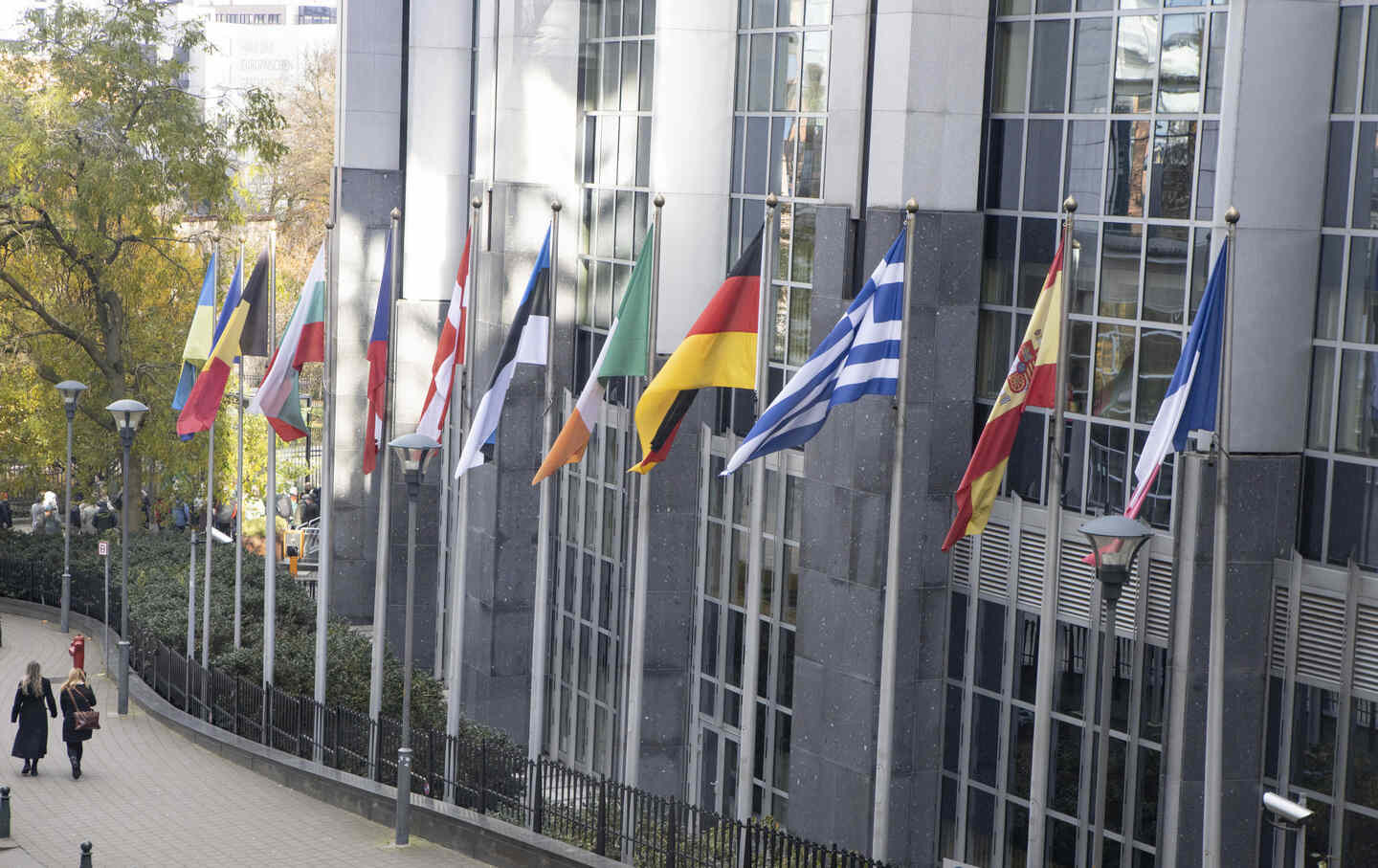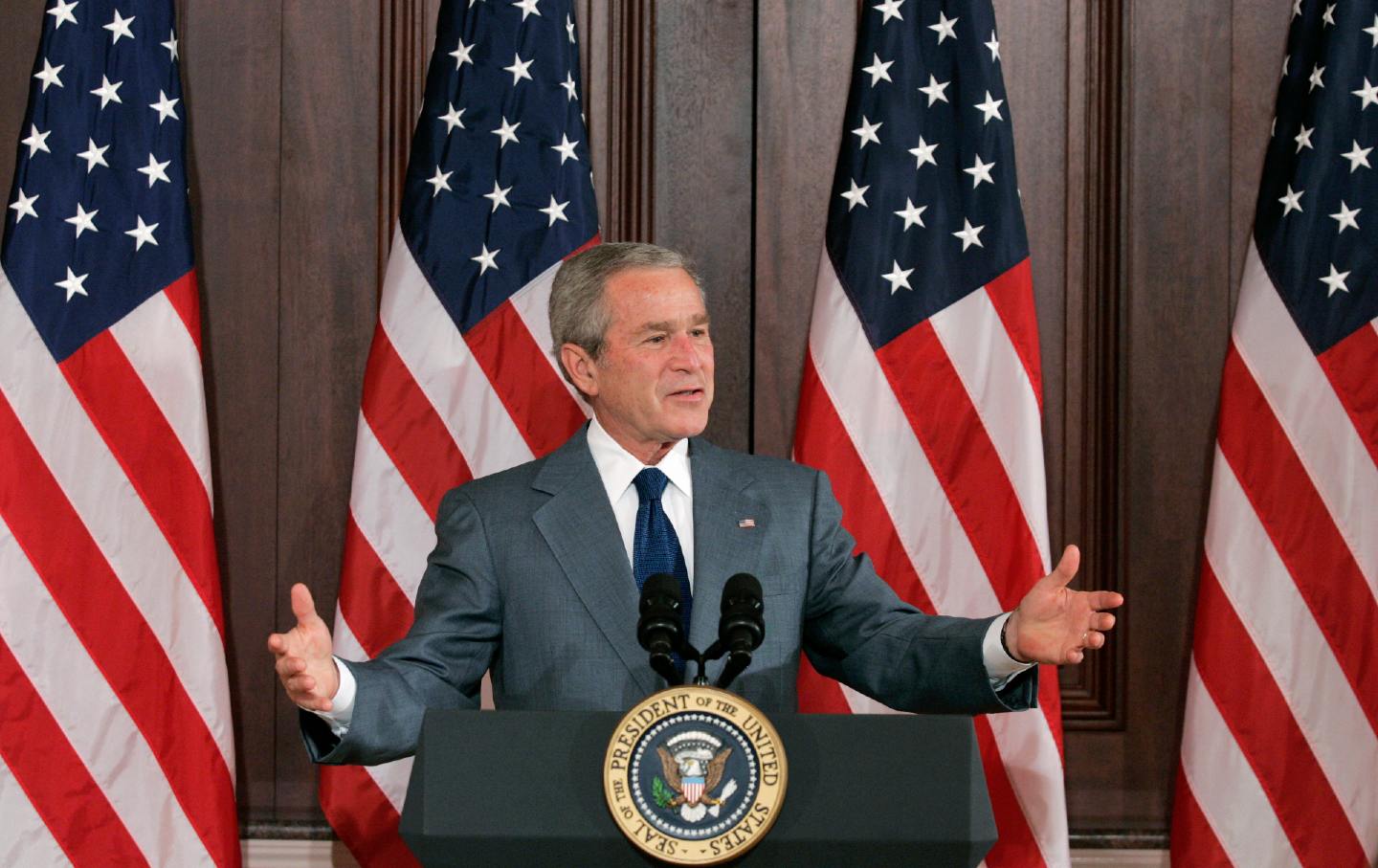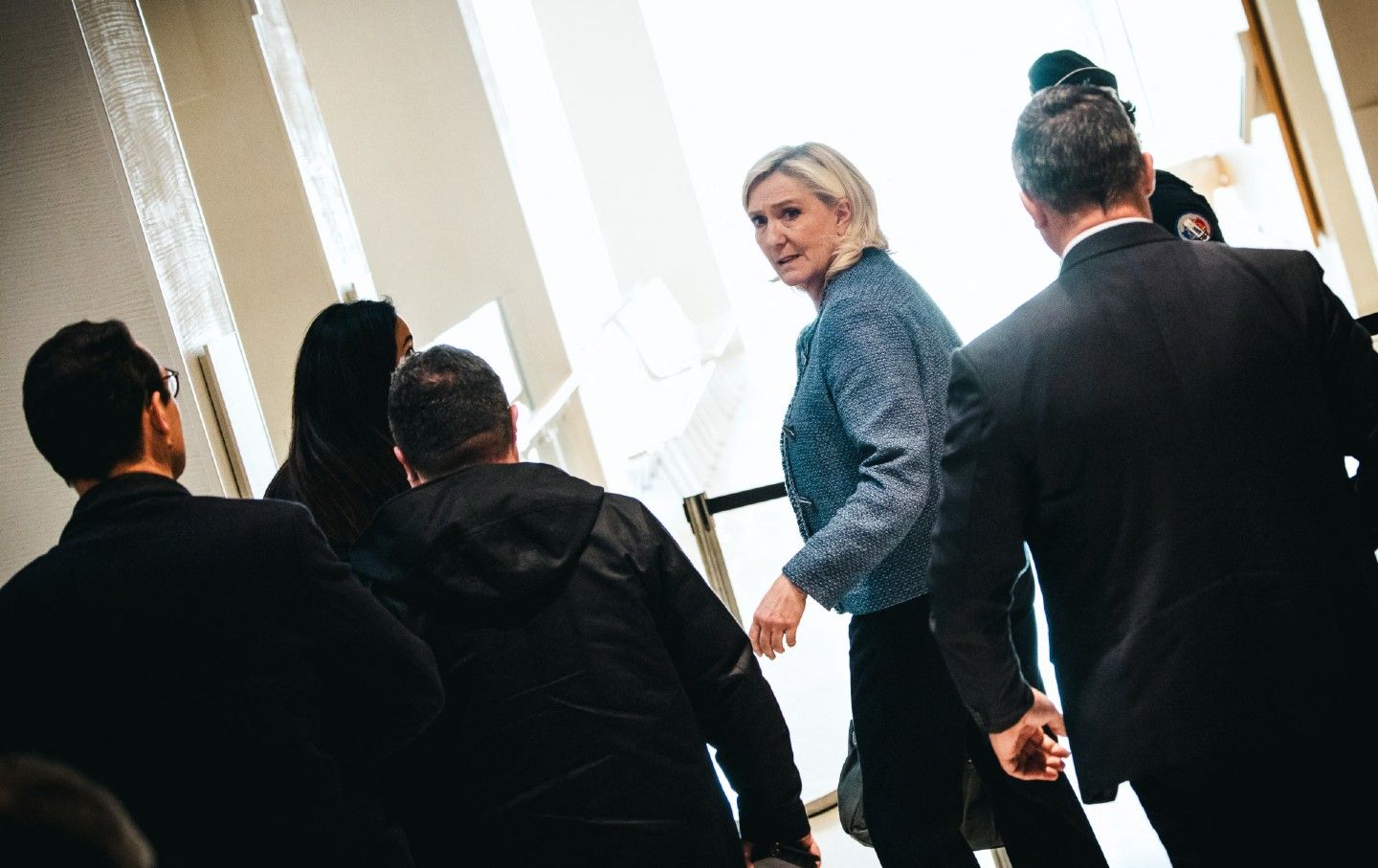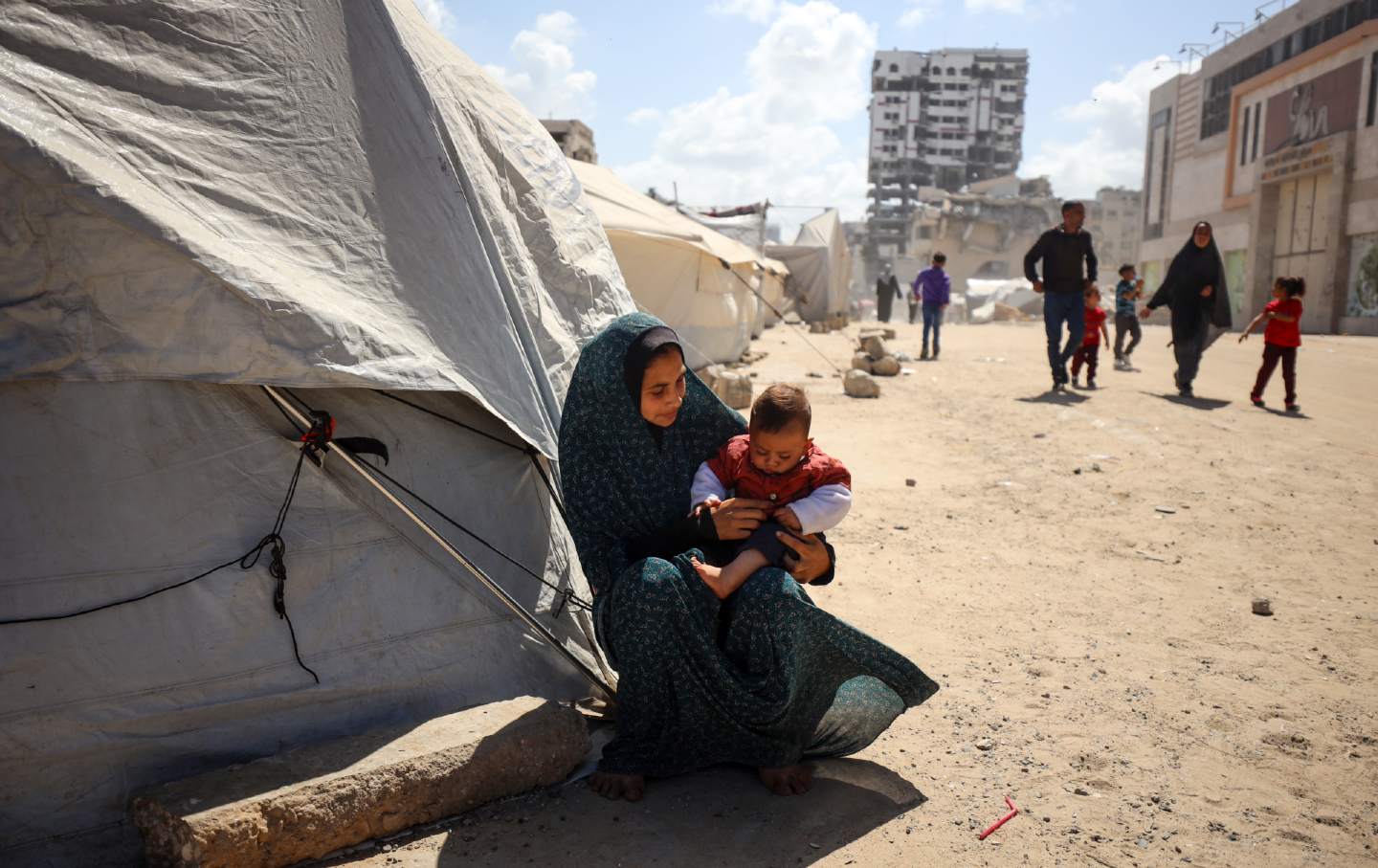Every University in Gaza Has Been Destroyed. So Have These Students’ Dreams.
The class of 2024 was supposed to graduate this year. Instead, they are trapped in the hell of Gaza, and their futures are unknown.
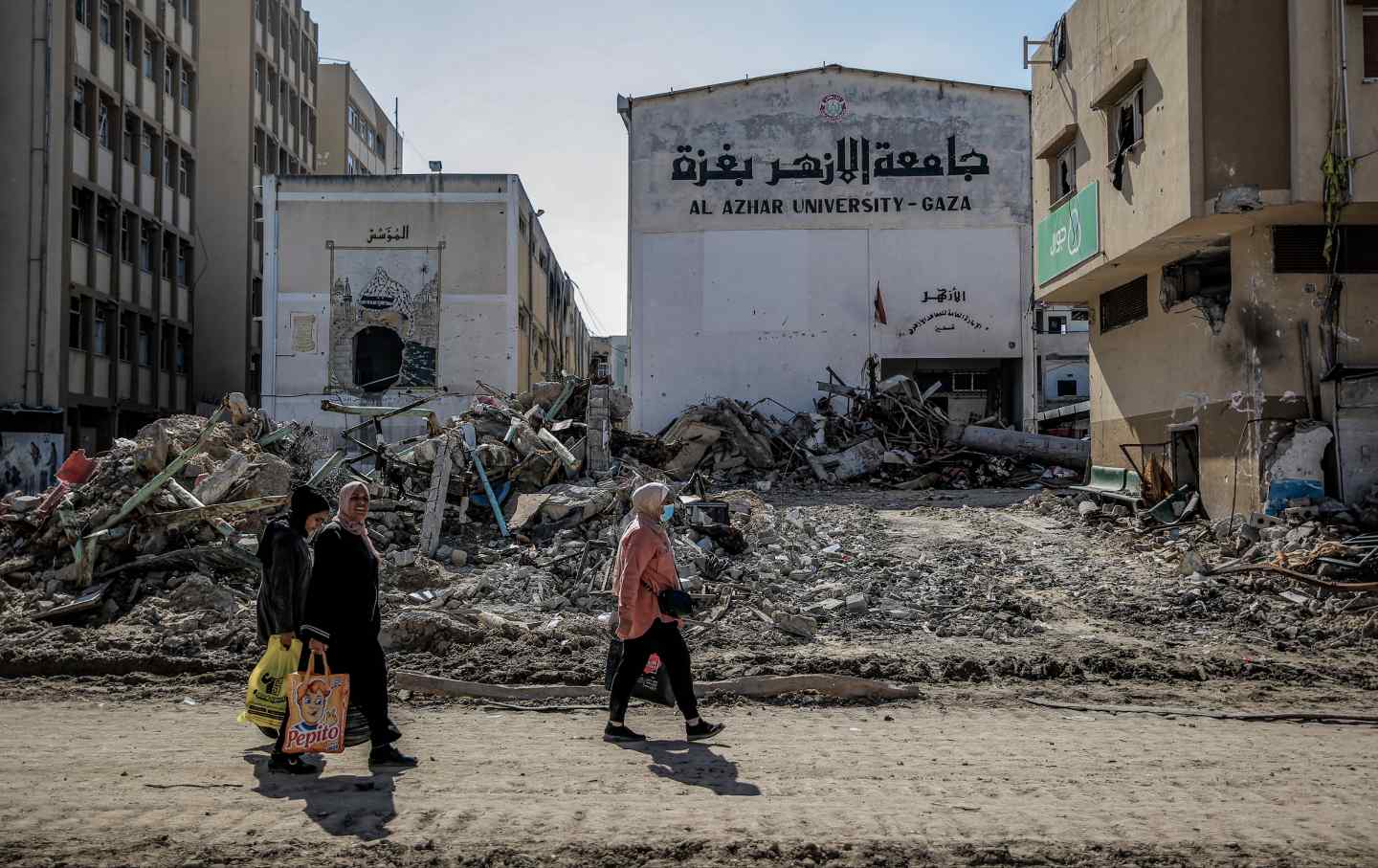
Palestinians walk next to the remains of Al-Azhar University in Gaza City on February 10, 2024.
(Omar Ishaq / picture alliance via Getty Images)Around 88,000 higher education students in Gaza were supposed to sit for their exams last month. Many looked forward to completing their final assessments and celebrating their hard-earned graduation.
Thanks to Israel’s genocidal war, though, nobody wore their caps and gowns. Instead, young people are enduring devastation of unparalleled magnitude. Every university in Gaza has been obliterated. Libraries have been burned to the ground. And the aspirations of Palestinian graduates lie in tatters.
In addition to the loss of loved ones, including family, friends, and professors, the conflict robbed these students of their ambitions and dreams— for a future now teetering on the edge of uncertainty. I spoke to a few students in Gaza to learn more about what they are going through. Here’s what they told me.
Razan
Razan and Nour were at the start of their fifth year pursuing dentistry at the University of Palestine in Gaza. They were top students in the department, and their bond was unbreakable.
“One of the challenges we face as dentistry students is finding cases to diagnose and treat. Whenever Nour came across extra cases, she always referred them to me. She consistently checked on me when I was in the clinic, especially during my practical exams,” Razan told me.
“We were a group of four friends, but Nour was the one I was closest to. I spent nearly my entire day with her, both in classes, during breaks, and outside the college. I always talked about her to my mother. My mom loved her dearly.”
Nour was also close to her own family, Razan said. “She was especially close to her older sister, Israa. Her father was very supportive, promising to help open her own clinic after graduation.”
Nour and Razan were supposed to graduate together.
“Last summer, we went on a city tour of Gaza as a reward for our hard work during a challenging senior year,” Razan reminisced, “we talked about our imminent graduation and how near we are to celebrate achieving that goal. Little did I know it would be our final trip together and the last time I’d see Gaza as I once knew it.”
In November 2023, an Israeli air strike killed Nour and her family, leaving only her little sister as the sole survivor.
Many months have elapsed, but Razan’s grief remains. “I still hold on to the belief that I’ll see Nour again when this nightmare ends,” she said. “There has never been, and never will be, anyone like Nour in my life.”
Razan also lost many professors, colleagues, and beloved school teachers. “My academic life was once bustling with activity,” she said. “Now, I realize how truly fortunate I was to experience such bliss. I yearn for it all.”
Frustrated by the disruption to her education and graduation, Razan stressed her right to learn. “This is my right as any other student in the world,” she said. Amid the shattered remnants of her dreams of a successful career, Razan’s primary longing now is simply “to feel safe.”
Residing in the governorate of Deir Al-Balah, amid ongoing assaults, Razan faces daunting obstacles in her quest to pursue online education. The reoccurring deadly invasions, enforced deprivation, and Internet blackouts aren’t the only barriers she grapples with. “I’m [too] mentally exhausted to process,” Razan admitted.
Mohammed
Mohammed, a scholar specializing in software engineering, was in his fifth year of studies at the University of Palestine in Gaza when the war broke out. Since then, he and his family have endured continual displacement and upheaval. “We have been displaced since the first day of the onslaught. Initially, we sought refuge at the Beach camp, then at Shifaa hospital, followed by the Nusirat camp, and eventually settled in the governorate of Deir Al-Balah,” he said. Their home in Beit-Hanoun, situated in northern Gaza, was reduced to rubble. All 10 of them now live in a 4×4 tent.
“Before the assault, I was working with my friends on our graduation project,” added Mohammed, “I dreamed of becoming a prominent software engineer and eventually.” Now, he runs a humble stall to alleviate the financial burdens weighing on his family.
Recalling the pivotal moment before the aggression erupted, he lamented, “I was on the verge of making strides in my career, having secured an interview with a leading company just before the assault began.”
Various initiatives were launched after the war began to facilitate online education for Gaza university students. Mohammed attempted to enroll in them, only to find that they were not conducive to his circumstances.
“The majority of available courses were tailored for freshmen and sophomores. Other universities only admitted students who are residing outside Gaza,” he said. The daily struggles of securing a reliable Internet connection and consistent power supply posed additional challenges for Mohammed.
Faced with these obstacles, he considered pursuing his education abroad. “I exhausted all my resources obtaining crucial documents like a passport and replacements for those I lost. But my final attempt faltered when the Rafah crossing border was suddenly shut down,” he said. Unable to chart a path forward, Mohammed’s last hope was crushed, leaving him bewildered about his next action.
Dima
Dima, a senior English language and translation student at the Islamic University of Gaza, was determined to seize every moment of her final academic year. “I even used to arrive way before class just to savor every minute of my university life before graduating,” she said.
Studying English poetry with Dr. Refaat Alareer, the legendary writer and teacher who was killed in an Israeli air strike in December, ignited her passion for her major early in her junior year. Another significant influence was participating in the “Women in Folktales” fair, organized by Alareer. She also joined We Are Not Numbers, an organization cofounded by Alareer, where she honed her media writing skills and got her articles published.
“I owe Dr. Refaat a great deal for my writing skills,” Dima said. “He generously shared his knowledge with us, provided the space to express ourselves, and encouraged us to write fearlessly. His office was always open for us. His departure is a tremendous loss. I can’t imagine our English department without him.”
Popular
“swipe left below to view more authors”Swipe →Dima once dreamed of becoming a journalist, pursuing further studies abroad, and eventually lecturing at universities in Gaza. However, her biggest dream now is simply to finish her BA degree and return home to Gaza City.
“I lost my uncle during the genocide. He was a huge supporter of my education. He wanted to congratulate me by enrolling me in a driving school, as I had wished,” she said.
Dima’s losses are profound and far-reaching: her uncle, her home, her esteemed professor, her academic institution, her cherished books, and the opportunity to graduate—all swept away in the tumult of genocide.
“When schools are destroyed, so too are hopes and dreams,” asserts a UN expert. The toll of destruction extends beyond mere infrastructure; it robs many other dentists, engineers, writers, teachers, doctors, artists, workers, nurses, lawyers, journalists, and pharmacists of their vocations and aspirations.
Nineteen higher education institutions in Gaza have been either completely devastated or partially damaged by Israel. In a stark act of scholasticide, Israel has killed at least 555 students and 100 academics during the genocide, according to the Palestinian Ministry of Higher Education and Scientific Research.
From the very beginning of the onslaught, Gaza’s leading university, the Islamic University of Gaza, was relentlessly targeted under the proclamation of being “an operational, political, and military center.” In January, the main buildings of Israa University were blown up into rubble after being commandeered by the Israeli occupation forces as a military base. Additionally, Israeli soldiers uploaded video of their setting the Al-Aqsa University library on fire. Ongoing Israeli assaults persistently target the education system, ensuring its total destruction and preventing its restoration for many years to come.
Only the end of this assault will allow Palestinian students to reclaim the opportunity to learn, embarking on a journey of healing that spans generations, and daring to envision a future where the talents of the nation’s youth contribute to a liberated Palestine.

